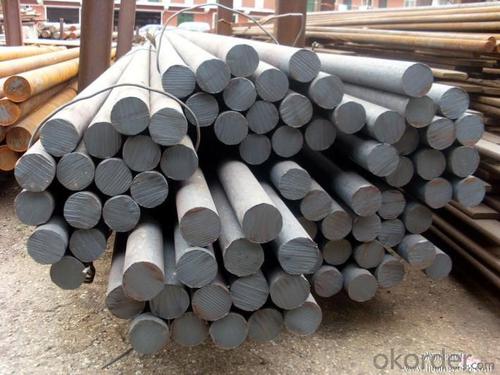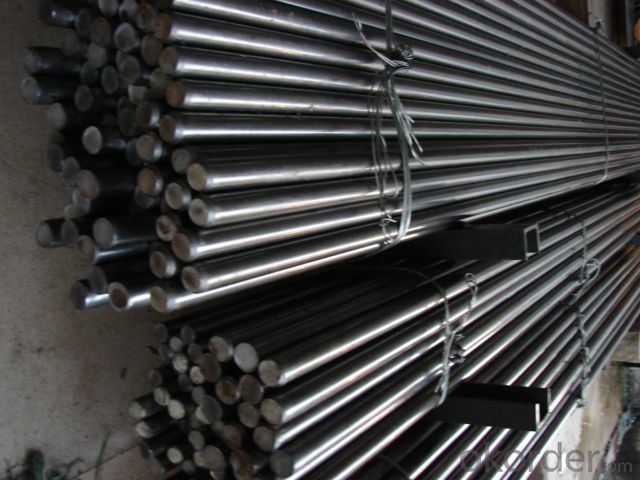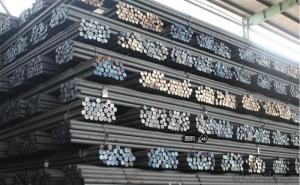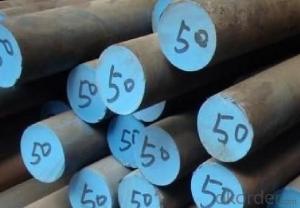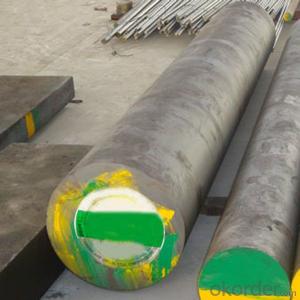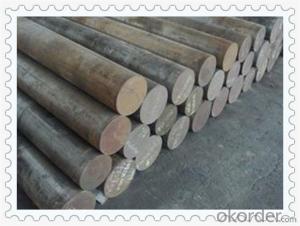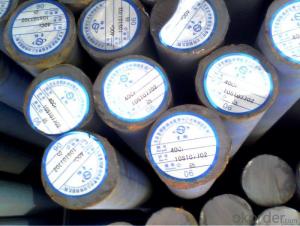SCM440 Forged Round Steel Bar Alloy Steel Bar
- Loading Port:
- China main port
- Payment Terms:
- TT OR LC
- Min Order Qty:
- 25 m.t.
- Supply Capability:
- 10000 m.t./month
OKorder Service Pledge
OKorder Financial Service
You Might Also Like
Specification
SCM440 Forged Round Steel Bar Alloy Steel Bar
Product information:
Diameter :250-800mm
Length:2.5M-12M
Steel grade : SCM440
We are making the below forged steel bars all the time and the detail is as followings:
40CrNiMo/42CrMo/38CrMoAl/50Mn/16Mn/40CrNiMo/35SiMn/AISI4140/AISI4340/SCM440/20Cr2Ni4/15CrMo/35CrMo/S355J2G3/15CrMo/Q345/17CrMnNiMo4
Standard:GB/T699/GB/T3077/ASTMA29/JIS/EN10083/DIN/
1)Delivery State:Hot forgerd +peeled+Normalizing+Quench+Temper Annealing that you can choose
UT:According Sep1921 Class 3 C/c or D/d.
Steel ingot:EAF+LF+VD.
2)Size:250-800mm
3)Length:1000-12000mm
4)Inspecting:UTS according to sep1921 or GB/T6402
5)Cut both ends
6)Payment:By 30% ,T/T in advanced payment or L/C at sight
7)Min qty:20MT
8)Dlivery terms:CFR or CIF
9)Delivery time:according to your qty
Product show
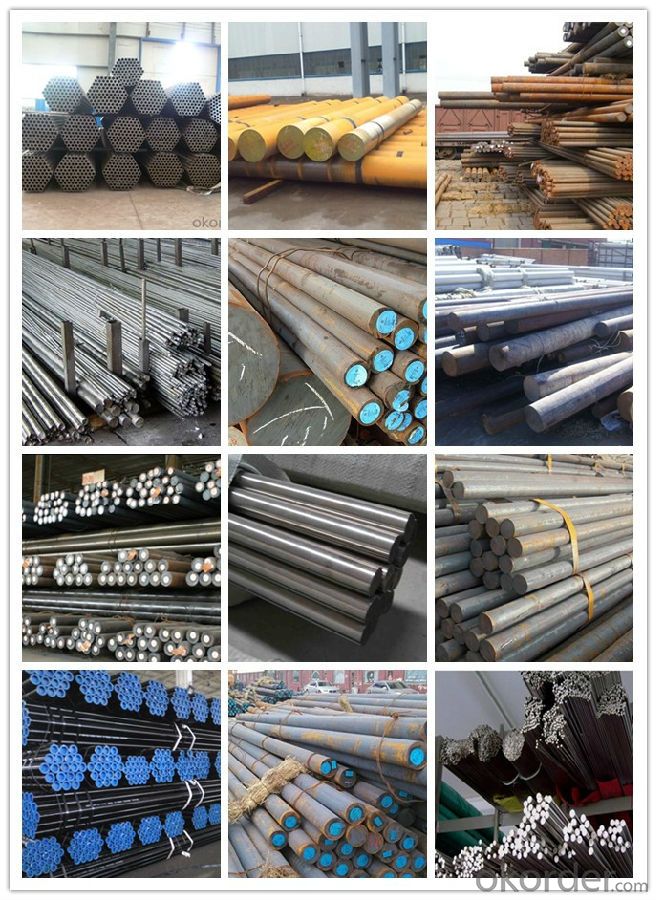
Workshop show
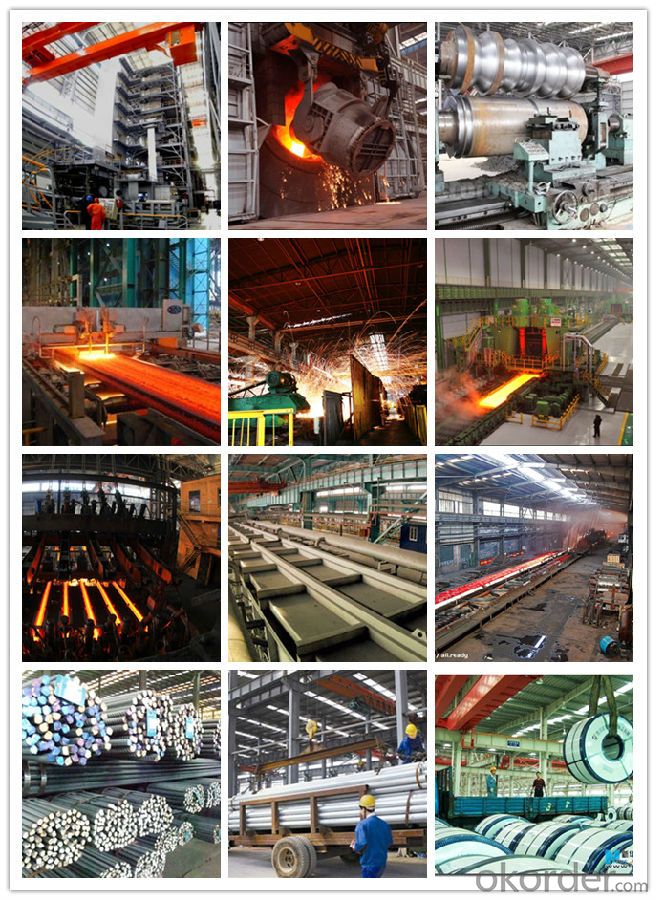
Our service:
-High manufacturing accuracy
-High strength
-Small inertia resistance
-Strong heat dissipation ability
-Good visual effect
-Reasonable price
Chose happens because of quality, then price, We can give you both.Additionally, we can also offer professional products inquiry, products knowledge train(for agents), smooth goods delivery, exellent customer solution proposals.Our service formula: good quality+good price+good service=customer's trust
SGS test is available, customer inspection before shipping is welcome, third party inspection is no problem.
If you need the sample, please feel free to let me know. Any question, we will contact you ASAP!
- Q: What are the different coating techniques for special steel parts?
- There are several different coating techniques that can be used for special steel parts. Some common ones include electroplating, powder coating, thermal spraying, and chemical vapor deposition. Each technique offers unique advantages and is chosen based on factors such as the desired coating properties, cost, and application requirements.
- Q: How does wear-resistant steel protect against abrasive wear?
- Wear-resistant steel protects against abrasive wear by having a high hardness and toughness, which allows it to withstand the abrasive forces and prevent material loss or surface damage. The steel's composition and heat treatment provide it with enhanced resistance to abrasive particles, reducing wear and extending the lifespan of the material.
- Q: What are the properties of corrosion-resistant tool steel?
- Corrosion-resistant tool steel possesses properties such as high hardness, excellent wear resistance, good toughness, and resistance to corrosion and oxidation. It is designed to withstand exposure to harsh environments, chemicals, and moisture, making it ideal for applications where resistance to corrosion is crucial, such as in marine environments or chemical processing industries.
- Q: How is special steel used in the construction of buildings and bridges?
- Special steel is commonly used in the construction of buildings and bridges due to its high strength and durability. It is used in various structural components such as beams, columns, and reinforcement bars, where its exceptional strength-to-weight ratio allows for the creation of lighter and more efficient structures. Additionally, special steel's resistance to corrosion and extreme weather conditions makes it a suitable choice for projects in harsh environments. Overall, special steel enhances the structural integrity and longevity of buildings and bridges, ensuring their safety and reliability.
- Q: What are the different methods of joining special steel components?
- There are several methods of joining special steel components, each with its own advantages and applications. Some of the most common methods include welding, brazing, soldering, and mechanical fastening. 1. Welding: Welding is one of the most widely used methods for joining special steel components. It involves melting the base metals and adding a filler material to create a strong bond. Different welding techniques, such as arc welding, gas welding, or laser welding, can be used depending on the specific requirements and properties of the steel components. 2. Brazing: Brazing is a joining process that uses a filler material with a lower melting point than the base metals. The filler material is heated and distributed between the components, creating a strong bond when it solidifies. Brazing is often used for high-temperature applications and can be done with a torch, furnace, or induction heating. 3. Soldering: Soldering is similar to brazing but uses a lower melting point filler material called solder. It is commonly used for electrical and electronic applications, as well as for joining small or delicate steel components. Soldering requires less heat and can be done with a soldering iron or a hot air gun. 4. Mechanical Fastening: Mechanical fastening involves joining components using mechanical means such as screws, bolts, nuts, or rivets. This method is often used when disassembly or reassembly is required, as it allows for easy removal and replacement of components. Mechanical fastening is suitable for applications where a strong and reliable joint is needed but welding or brazing may not be feasible. 5. Adhesive Bonding: Adhesive bonding is another method used for joining special steel components. It involves applying an adhesive material to the mating surfaces and allowing it to cure or harden, creating a strong bond. Adhesive bonding is often used when a continuous joint is required or when joining dissimilar materials. It is also advantageous for applications that require vibration damping or sealing. Each method of joining special steel components has its own strengths and limitations, and the selection of the appropriate method depends on factors such as the specific requirements of the application, the properties of the steel components, and the desired strength and durability of the joint.
- Q: How does special steel perform in high-temperature oxidation conditions?
- Special steel, otherwise known as heat-resistant or high-temperature steel, is designed specifically to excel in conditions of high-temperature oxidation. At elevated temperatures, oxidation occurs as a chemical reaction between the metal and oxygen, potentially resulting in the degradation or failure of the material due to the formation of metal oxides. Nevertheless, special steel contains alloying elements that offer exceptional resistance to oxidation. These alloying elements, such as chromium, aluminum, and silicon, create a protective layer of oxides on the steel's surface when exposed to high temperatures. This layer acts as a barrier, preventing further oxidation of the underlying metal. Moreover, the alloying elements can promote the formation of stable and adherent oxide scales, further enhancing the steel's resistance to oxidation. The outstanding performance of special steel in high-temperature oxidation conditions can be attributed to several factors. Firstly, the alloying elements in the steel composition ensure the formation of a protective oxide layer, effectively shielding against further oxidation. Secondly, the steel's microstructure is specifically designed to maintain stability and retain its mechanical properties even at elevated temperatures. In addition, special steel undergoes stringent heat treatment processes to enhance its resistance to high-temperature oxidation. Heat treatment methods such as annealing, quenching, and tempering optimize the steel's microstructure and eliminate impurities, guaranteeing optimal performance in extreme conditions. In summary, special steel showcases remarkable resistance to high-temperature oxidation conditions due to its carefully chosen alloying elements, tailored microstructure, and optimized heat treatment processes. It provides a dependable and long-lasting solution for various industries that require materials capable of withstanding severe oxidation environments, ensuring optimal performance and durability in these challenging conditions.
- Q: How does special steel contribute to the automotive material recycling?
- Special steel contributes to automotive material recycling in several ways. Firstly, special steel is highly durable and resistant to corrosion, making it ideal for use in various automotive components such as engine parts, chassis, and body structures. This durability ensures that these components have a longer lifespan, reducing the frequency of replacement and consequently reducing waste generation. Additionally, special steel is highly recyclable, meaning that at the end of a vehicle's life cycle, the steel components can be easily and efficiently recycled. The recycling process involves melting down the steel and reusing it to create new steel products, thereby reducing the need for extracting and processing raw materials. Furthermore, the use of special steel in lightweighting initiatives, where lighter materials are used to reduce a vehicle's weight, contributes to fuel efficiency and lower emissions. This is significant for automotive material recycling as lighter vehicles require less energy to operate, resulting in reduced fuel consumption and environmental impact. Overall, the use of special steel in the automotive industry plays a crucial role in promoting sustainability through extended component lifespan, efficient recycling processes, and improved fuel efficiency.
- Q: How does bearing steel contribute to the manufacturing of bearings?
- Bearing steel is a specific type of steel that offers high hardness, durability, and corrosion resistance, making it ideal for the manufacturing of bearings. The properties of bearing steel allow for the creation of strong and long-lasting bearing components that can withstand heavy loads, high temperatures, and intense rotational speeds. The steel's hardness helps to prevent wear and deformation, ensuring smooth and efficient bearing operation. Overall, bearing steel plays a crucial role in ensuring the reliability and performance of bearings in various industrial applications.
- Q: How does special steel contribute to reducing product defects?
- Special steel contributes to reducing product defects by offering superior strength, durability, and corrosion resistance compared to regular steel. This ensures that the components made from special steel are less prone to breakage, wear and tear, or damage during manufacturing, transportation, or usage. Special steel's high-quality characteristics provide a more reliable and consistent performance, resulting in fewer product defects and improved overall product quality.
- Q: What industries commonly use special steel?
- Special steel, known as alloy steel as well, finds extensive use in diverse industries owing to its exceptional properties and performance characteristics. Several industries frequently employ special steel, including: 1. Automotive Industry: Special steel is extensively utilized in manufacturing automobile components such as crankshafts, camshafts, gears, and axles. Its exceptional strength, durability, and excellent heat resistance make it suitable for enduring the demanding conditions of the automotive sector. 2. Aerospace Industry: The aerospace industry relies on special steel to manufacture critical components like turbine blades, landing gear, and structural parts. Its ability to withstand high temperatures and maintain structural integrity under extreme conditions is vital for aerospace applications. 3. Oil and Gas Industry: In the oil and gas sector, special steel is crucial for applications like drill bits, valves, pipelines, and offshore platform components. Its corrosion resistance, high strength, and ability to withstand extreme temperatures and pressures make it suitable for these challenging environments. 4. Construction Industry: Special steel serves the construction industry in fabricating structural components, reinforcement bars, and high-rise building frameworks. Its high tensile strength, toughness, and resistance to wear and tear ensure the safety and stability of the structures. 5. Tool and Die Industry: The tool and die sector widely employs special steel in manufacturing cutting tools, molds, dies, and various machine components. Its capability to retain sharpness, resist deformation, and withstand high pressures and temperatures make it indispensable for these applications. 6. Energy Industry: Power generation plants, including nuclear, thermal, and renewable energy facilities, extensively utilize special steel. It is employed in manufacturing turbines, boilers, heat exchangers, and other critical components, thanks to its high temperature and corrosion resistance properties. 7. Medical Industry: In the medical field, special steel plays a crucial role, particularly in surgical instruments and implants. Its biocompatibility, strength, and corrosion resistance make it suitable for applications like joint replacements, dental instruments, and surgical cutting tools. 8. Manufacturing Industry: Various manufacturing processes like machining, forging, and casting widely rely on special steel. It is employed in the production of machine tools, industrial equipment, and heavy machinery components due to its high strength, toughness, and versatility. These examples represent just a fraction of the industries that commonly employ special steel. Its unique properties make it an indispensable material for a wide range of applications where strength, durability, heat resistance, and corrosion resistance are critical factors.
Send your message to us
SCM440 Forged Round Steel Bar Alloy Steel Bar
- Loading Port:
- China main port
- Payment Terms:
- TT OR LC
- Min Order Qty:
- 25 m.t.
- Supply Capability:
- 10000 m.t./month
OKorder Service Pledge
OKorder Financial Service
Similar products
Hot products
Hot Searches
Related keywords



